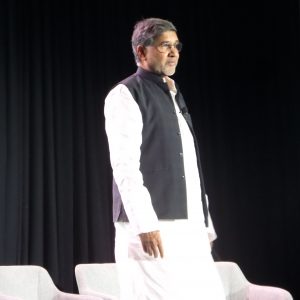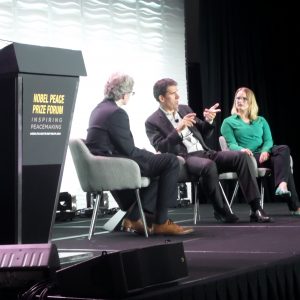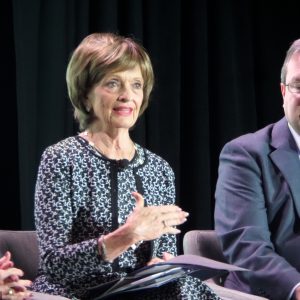Part 2. Nobel Peace Prize Forum June 6-8, 2016: The Drowning Child and the Shoes…2016 Nobel Peace Prize Forum, Bloomington MN
This years Nobel Peace Prize Forum focused on “Globalizing Compassion”, particularly children, and gave a very large role to the co-2014 Nobel Peace Prize Laureate Kailash Satyarthi, a native of India who passed over a career in engineering to invest his life work on issues relating to child trafficking. More about his Children’s Foundation is here.
Satyarthi is an immensely engaging and persuasive man. You can see and hear him speak at this years Nobel Peace Prize Conference at the weblink listed below.
(click to enlarge)

co-2014 Nobel Peace Prize recipient, Kailash Satyarthi, June 7, 2016 Nobel Peace Prize Forum, Bloomington MN
Many of the talks at this years Forum are accessible online here. They are all worth your viewing time.
The brimming-with-information Program Booklet for the 2016 Forum can be read here: 2016 Nobel Forum001
My comments, Part One about the 2016 Forum is here.
Wednesday afternoon, June 8, the final day of the Nobel Peace Prize Forum, we were on our final coffee break. One of my colleague participants asked me what I thought of this years Forum. I said I always like workshops like these, where I know hardly anyone, including the speakers. It never fails, I said, that I leave without some insights, useful to me.
The conference adjourned, and I went home exhausted.
There was a final program, a film, The Same Heart, in the evening that I almost decided to miss.
Along with perhaps 50-100 “remnants” (not unusual after long conferences), I was at the theatre, and it was during The Same Heart that I experienced one of those insights I’d mentioned a few hours earlier.
The film is about the realistic possibility of eliminating the worst poverty for perhaps a billion children world wide. The film opened with a camera focusing on what appears to be a lake, and then panning back to a narrow stream.
Peter Singer*, ethicist at Princeton University, posed a question to the viewers: suppose that you are standing on the banks of a brook, and you look across to the other side and see a toddler going in the water, almost certainly about to drown. You are the only adult. The brook is shallow, but entering the water will ruin your new shoes.
What would you do?
His basic point was that there are hundreds of millions, if not billions of such toddlers around the world today, in effect drowning in circumstances out of their control, and most of us in varying degrees of affluence are unwilling to sacrifice our personal pair of new shoes to help them out. The message has stuck with me since I watched the film last week. It will not soon go away.
What would, what will I do?
The other insight came in bits and pieces, but it came together during a session on Tuesday afternoon.
An official of UNICEF, Olav Kjorven, Director of Public Partnerships, was talking about a UNICEF “My World” survey, about the “World We Want”, where millions of people expressed their opinion about priorities for humanity.
Almost off-handedly he commented on the unlikely creation of the Millennium Development Goals (MDG) by the UN at the beginning of the 21st Century, ending 2015. It seemed (my opinion) that a major reason these goals were adopted relatively easily was not so much because anyone thought they could be attained, but that they really were seen as a set of informal goals for the world which would not upset anyone’s “apple cart”, be stuck with commitments, and especially wouldn’t require much funding.
The MDGs have turned out to be much, much more substantive. “Grassroots” people have taken them seriously, and in a sense policy is being proposed and implemented from the bottom up, rather than imposed top down.
I was somewhat familiar with these goals. In 2005, I had attended a session on the Millennium Development Goals. One of the featured speakers was Marilyn Carlson Nelson, a powerful Twin Cities businesswoman who came out strongly about tackling child sex trafficking: her business, as we Minnesotans know, is the hospitality industry, worldwide. My notes about that meeting are here: MDG Workshop 2005001
Ms Carlson Nelson was part of a panel at this years Peace Prize Forum, and in her time period she said her insight moment came in 2004 from someone she said was “Amb. Miller” who heightened her awareness that her industry had a major problem with child sex trafficking. She took a very serious look at her own industries cause in the matter, and has taken action, and is still taking action, and most importantly has become a public witness for closer attention to justice in other areas as well.
She quite clearly became a behind the scenes leader in settling the Minnesota Orchestra lockout three years ago; most recently Mark Ritchie mentioned her as a very positive actor. The saying “don’t judge the book by its cover” comes to mind; or be careful about “painting with a broad brush”.
Progress is a process, often slow, but progress happens with effort.
At the same meeting in 2005 was my friend, Dr. Bharat Parekh, who decided to take on the problem of child malnutrition in his native India, implementing one of the MDG’s. Here is a talk given by Dr. Parekh in 2014, talking about the then-progress on his work towards a goal.
I don’t know what his aspirations were, but Dr. Parekh had a plan, and he worked it hard – I watched what he was doing as elements began to come together – to the extent that now he is a Board member of a major organization called Toddler Food Partners, and is making a big difference.
Back at the conference, Mr. Kjorven noted that at the end of the 15 year MDG period, the “World We Want” survey (previously mentioned) gave great grassroots impetus to the current UN Sustainable Development Goals.
I left the 2016 Nobel Peace Prize Forum exhausted and, at the same time, renewed and refreshed.
People can and do make the crucial difference. They just need to believe their capacity to make that difference.
A WONDERFUL POSTSCRIPT: The final session of Wednesday afternoon was dryly described as “Closing Remarks” with a two line descriptor: “Nobel Peace Prize Forum Executive Director Gina Torry will close the final afternoon of the 2016 Forum.” This was a “don’t judge the book by its cover” descriptor, as the session began with a wonderful tribute to my deceased friend, and stalwart of the Nobel Peace Prize Forum from 1997 on, Lynn Elling, deceased Feb. 14, 2016. Featured was a video by public television made about 1993 which needs no elaboration. The segment concluded with a hashtag #peaceitforward…a wonderful tribute.
June 25: Recently the Aitkin Independent Age newspaper featured a long article about Lynn and his work in his lake country community. You can read it here: Big Sandy Lake and dad article
* * * * *
* I note that Dr. Singer’s views on certain issues have excited some controversy which is hi-lited on the internet. That is of no concern to me, here. We all have points of view. His drowning child and shoes image will always stick with me.



Leave a Reply
Want to join the discussion?Feel free to contribute!